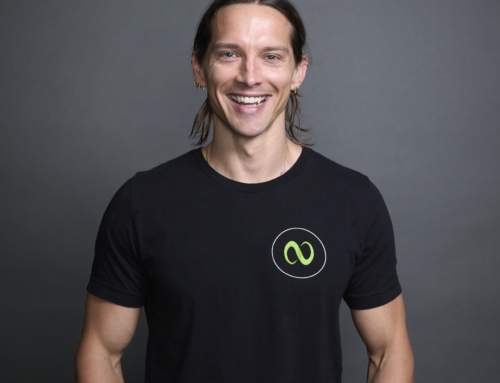The quality of our posture is a major concern and rightfully so. Our minds are always reading the nonverbal cues that people around us are presenting and posture can be an indicator of physical and internal energy. Our posture can help us look younger and more vibrant or older and fatigued. Poor posture can disrupt your digestion, stifle your breath function, and lead to structural damage that could have you permanently looking directly at the ground.
Let’s break down understanding “posture” into a couple categories: mindset and physicality.
Why start with mindset? In Nimble Fitness, our holistic strength and conditioning studio, we find that our clients who begin their training sessions by matching their intentions with quality self-talk experience better results. This practice guides our subconscious to create lasting habits that elevate our energy, activate our nervous system and take better care of our bodies mentally, physically, and spiritually. Mindset empowers us to move with relaxed confidence and ease.
How do we embody good posture? Ideally, our head, thorax, pelvis and legs will stack over one another with relative ease. If we are standing straight our ears, shoulders, hips, knees and ankles would be in alignment. Your arms hang like hangers with your muscles relaxed around the scapula. Often we see clients thinking that they need to squeeze their shoulder blades back to stand up tall. This holding pattern actually pushes your neck forward, holds the thoracic spine rigid in gait and throws off your moving posture! A better posture cue we use at Nimble is to maintain your eyes on the horizon, keep your knees fully extended (but not locked), and use “soft eyes” to open your gaze to see more of your surroundings without fixing your vision on one point in front of you.
It takes energy to maintain dysfunctional postures, and it might take some soft tissue work, stretching and strengthening over years to help re-establish better postural alignment.
The way we hydrate, nourish ourselves and sleep also all have a major effect on our posture. Dehydration is directly linked to having lower energy and can lead to muscles becoming less neurally active. Poor sleeping habits rob us of the time we need to heal, while eating a diet rich in nutrients fuels us with quality energy and a strengthened sense of well-being. When we feel more energized, the chances of us standing upright and owning our posture greatly increases.
We can’t talk about posture without talking about posture in movement. One of the best exercises we can do for ourselves is walking. Walking is an opportunity to heal your body and cultivate energy if performed with the right intent and function. Remember, keep your eyes on the horizon and walk with a relaxed gait–allow your arms and ribcage to move freely and rotate as a result of your tempo. Gait is extremely complex (and we are only touching on a single aspect) but the pro-tip I want to share is: leave the bags at home! They are tugging on your neck and creating stronger fascial straps from the repetitive loading of the same tissue over the years.
Structural alignment is married with understanding your body, your mobility and repetitive holding postures. The alignment I’m focusing on here is knowing your “home base”: the calibration of the lower leg, hips and upper body. At Nimble, we teach our clients to better understand their alignment and posture by guiding them through performing self myofascial tissue work, controlled articulations and conditioning movements that activate the postural stabilizing muscles.
Functional strength and mobility are like Yin and Yang. They dance together, constantly trying to balance themselves. Do you put your legs up on an ottoman every night? Have you crossed the same leg while at work every day for the last twenty years? Is your work and home space ergonomically sound? This list of possible posture pitfalls goes on and on! Assess your life and the habitual, repetitive elements that are taking you out of alignment. Correcting them is the first thing you can do to improve your current posture.
Conditioning quality breath function is also key to sustaining core strength and a healthy lower back–Having a quality diaphragmatic breath is essential to good posture. Consistently practicing better breathing habits helps you have increased stability throughout the entire day, liberating more oxygen from the red blood cells and cultivating more energy! We coach to breathe in through your nose all day every day. The resistance from breathing nasal helps activate the diaphragm creating better intra-abdominal pressure. This biomechanical stabilization helps us maintain better posture while also helping other aspects of our health.
Remember, the secret to having great posture is training for it!
Keep it simple and select any ONE of these things to change and take action with to improve your posture.
- Mindset
- Energy (hydration, nutrition, sleep)
- Gait
- Alignment
- Understanding your own body
- Habitual behaviors
- Mobility/Flexibility
- Functional Strength
- Optimal breath function
Your lifestyle will dictate the quality of your posture later in life! Raise your awareness to what habits you have while at home, work, walking and standing. It’s up to you to decide how you will train your body. We get asked often about posture, and if you’re wondering about your posture, contact us at Nimble Fitness for a complimentary assessment. It has been curated over the last twenty years and designed for us to see what you need and where to start.
Namaste,
Daniel



